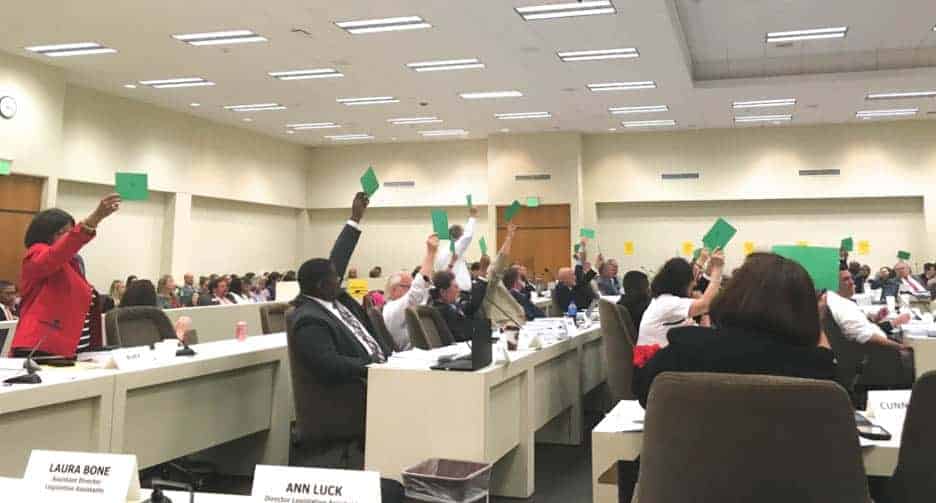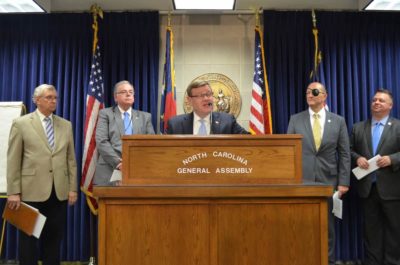

The House spending plan for the next two years cleared the House appropriations committee today, freeing it to head to the House floor for votes on Thursday and Friday.
The plan appropriates about $14 billion for education in 2019-20 — a 2% increase from the prior year — and about $14.3 billion in 2020-21.
The budget’s pay plan includes $346 million in funding for educator raises. Under the plan, teachers would get an average 6.3% increase over the biennium (4.6% in the first year), according to Rep. Jeffrey Elmore, R-Wilkes. The pay raises are weighted towards teachers with 26 or more years of experience because lawmakers have heard that these teachers are retiring early rather than staying in the profession. The increase would bring the average teacher salary to $55,600 by 2020.
Under the pay plan, the current salary schedule would continue until December 2019. The only raises there would be the normal step increases that teachers would ordinarily get. Then the new salary schedule would start in January 2020, but lawmakers’ proposed pay increases there only apply to teachers with 16 years of experience or more, with a teacher of 30 years or more making $60,500.
“We’re trying to stabilize this scale so that in the future we can do across the board cost of living increases,” Elmore said in an interview. “We feel like this proposal stabilizes that scale.”
He said that the information lawmakers received when they first started raising teacher pay was that beginning teachers were more likely to leave the profession, so the General Assembly targeted pay raises towards them. Later, it was mid-career teachers lawmakers were worried about, so they focused their pay increases on those educators. Now, Elmore said veteran teachers are retiring early, so the pay plan aims to entice them to stay in the classroom. A common criticism of General Assembly pay raises is that they shortchange veteran teachers.
This proposal stands in contrast to the one released by Gov. Roy Cooper. In his budget plan, the governor proposed spending $600 million over two years to increase teacher pay. The funds would amount to an average increase of 9.1% over the biennium for teachers. Under his plan, no teacher would receive less than a 3% increase in either year of the biennium.
Principals will get an average 10% pay increase in the first year of the biennium under the House plan, but it’s not clear according to the summary of the pay plan what the increase will be in the second year. Assistant principals would get an average 6.3% increase in the first year. The principal pay schedule would now also be aligned with the teacher pay schedule so that if teacher pay changes the principal salary schedule will also change to reflect that.
Elmore said aligning the two schedules will help prevent problems that arise between teachers and administrators within schools.
“Because they were not linked together, entities in the same school were competing over salary dollars,” he said.
Previously, principals were paid based on the size of their school and school growth alone. They still will be under the new budget, but their base salary will ultimately also reflect their years of experience. Principals will receive whatever a teacher of similar experience would get plus 25 percent. Then size of the school and growth scores would round out the rest of the salary.
The committee broke midday to allow lawmakers to meet with teachers rallying outside as part of the May 1 Day of Action. The committee came back at 2 p.m. and after some confusion began taking on amendments. A portion of the amendments touched on education, but there were no significant changes to those portions of the budget. Some of the education-related amendments were duplicates of ones brought up in the House education appropriations committee last week.
Rep. Rosa Gill, D-Wake, tried to amend the budget to remove a section that would prevent teachers from taking personal leave unless a substitute is available. This provision was seen by critics as an attempt to stifle teachers’ ability to go to a rally, such as the one seen outside the General Assembly today.
“If you don’t want teachers to march on Raleigh every year, there is a much easier approach,” Gill said. “We need to start listening to teachers.”
The amendment was brought up in the House education appropriations committee last week and failed. It also failed in the committee today by a called vote of 37-44.
Another proposed amendment — also previously heard in House education appropriations — attempted to siphon money from the opportunity scholarship fund and use it to provide two-year scholarships to students from the North Carolina School of Science and Math. It would take $1.5 million out of the program each year for this purpose.
The bulk of the argument was whether or not decreasing the money from the opportunity scholarship fund would shortchange low-income public school students who use it to get scholarships to private schools. Those in favor of the amendment pointed out that the base budget funds for opportunity scholarships increase by $10 million each year, and yet there has been leftover money in the pot every single year that the program has been in existence. The amendment ultimately failed.
Other highlights of the the budget proposal are:
— A plan that would allocate a $15 million non-recurring increase in funding for school supplies. That additional money would be used to give each teacher in the state $145 to purchase classroom supplies themselves. The total amount of money for classroom supplies in the budget is $62.5 million in both years of the biennium. The remainder of the money, after that going to teachers, would go to districts for purchases.
— Restoration of extra pay for teachers with advanced degrees, a move that many critics of the Republican-led General Assembly have been asking for since that pay was eliminated in the state budget in 2013. This is also one of the asks of the teachers who marched today in support of public education.
— Additional slots for NC Pre-K, which would get funding for 1,700 more slots in 2019-20 and 1,700 in 2020-21, for a total of 3,400.
— Non-recurring funding for a virtual early learning pilot, which has become a controversial proposal suggested in the House over the past couple of weeks. Rep. Craig Horn, R-Union, has said that this program is for those children who wouldn’t get access to NC Pre-K no matter how many slots were available.
— A change to school performance grades. Under this budget plan, they would now be calculated using a 51/49 split in favor of academic achievement. Currently, the split is 80/20 between achievement and academic growth respectively. The budget also preserves the 15-point grade scale.
— Money for school safety, including $19 million non-recurring in the first year and about $30 million recurring in the second year for School Mental Health Support Personnel Grants. Other items related to school safety include:
- School safety officers: $3 million non-recurring in the first year, and $7.7 million recurring in the second year
- School Safety Equipment Grants: $3 million non-recurring in the first year, and $6.1 million non-recurring in the second year
- School Safety Training Grants: $3 million non-recurring in the first year, and $4.6 million recurring in the second year
- Students in Crisis Grants: $2 million non-recurring in the first year, and $4.6 million recurring in the second year
— Funding for community colleges to narrow the funding gap between curriculum programs and short-term workforce training. Budget includes $8 million in the first year and $11.5 million in the second year.
— Extra money for career coaches. The Community College System will get $2.8 million recurring in both years.
— Provides $6.9 million in the first year of the biennium and $13.9 million in the second year for increased pay for community college personnel. The last three items were part of the Community College System legislative agenda.
The budget does not include the House’s $1.9 billion bond proposal, which would provide about $1.5 billion for new K-12 schools and about $200 million each for the UNC System and Community College System. A competing school infrastructure bill in the Senate would not require a bond.


